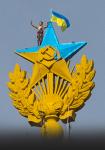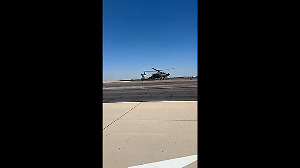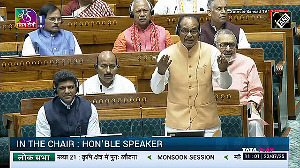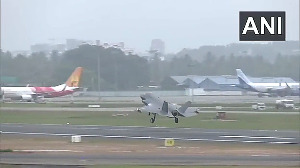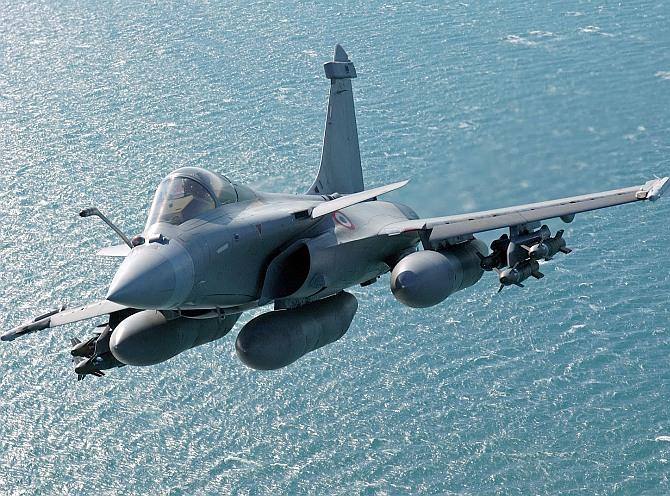
While the Rafale deal seems to be the main order of business during French President Francois Hollande's visit, other aspects could help sweeten the deal, says Claude Arpi.
There was a time when head of States could leisurely travel abroad and spend a couple weeks visiting one or two friendly foreign countries.
The times have changed. Like CEOs, they fly for a meeting at one corner of the planet and rush back the next day to deal with the complexities of domestic issues. Francois Hollande is no different.
On December 16, the Elysee Palace, as the France presidency is known, issued a short communique announcing that President Hollande would be the chief guest for India's Republic Day celebrations: 'This invitation conveys the excellent quality and dynamism of the strategic partnership between India and France, which will be further strengthened on this occasion. This visit will also follow on from the Paris Climate Conference, at which India played a decisive role in reaching an ambitious agreement.'
Well, let us be clear, Hollande does not come to discuss the weather with Prime Minister Narendra Modi. The outcome of the Paris Conference, for which France worked hard for several months, was vague enough to leave to each country to be a good pupil if it wants, and to fulfill its promises.
Hollande comes to India to take the next step in the Rafale deal; of course, France like India has lately been the victim of terrorism.
As the French government was recovering from the November 13 horrific attack and commemorating the killings of several journalists at Charlie Hebdo, the symbol of the French 'Liberte' of expression, attackers from the other side of the Indian border, stepped into the Pathankot airbase and created havoc for nearly three days.
On January 4, France condemned 'the attack perpetrated against the Indian military base in Pathankot', adding: 'We extend our condolences to the victims' families as well as to the Indian government. France stands alongside India in the fight against terrorism.'
The Rafale deal remains nonetheless the raison d'etre of the busy French president's visit to New Delhi.
For Hollande, it is important at a time when his popularity is again tumbling down (12 points in one month according to Le Figaro), despite an unexpected surge following November 13.
For Modi, it is also crucial to demonstrate that he not an impotent prime minister, only capable of 'declarations' followed by nothing concrete.
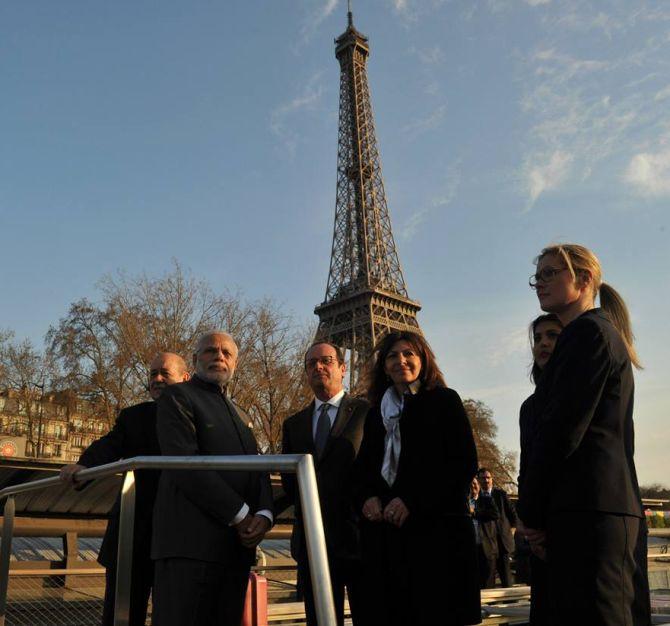
What is the situation about the Rafale deal as I write this?
A defence ministry source quoted by The Times of India said that there is 'still some distance to go'for the final contract for the 36 fighter planes to be delivered in a 'flyaway condition, off-the-shelf.'
One of the problems is that it is 'off-the-shelf' with Indian characteristics -- a tortuous process of offset policy and other procurement niceties.
On January 11, though the defence acquisitions council, under Defence Minister Manohar Parrikar, reviewed the progress of the negotiations for a final government-to-government agreement, nothing is certain. 'It's unlikely the actual contract will be inked during Hollande's visit,' a source told the ToI, adding: 'Though all the complex technical and contractual issues have virtually been settled now, the commercial negotiations will take at least another 2-3 weeks. Then, it will require clearance from the finance ministry, and the final nod from the Cabinet Committee on Security.'
Everyone knows that in India days can easily become months, if not years.
While Parrikar made a vague remark, 'it's closer to completion,' refusing to go into the details, French Defence Minister Jean-Yves Le Drian is quoted by Reuters saying 'nothing has been finalised as yet.'
It means that the deal is far from being concluded.
It probably explains National Security Advisor Ajit Doval's sudden rush to Paris 'to talk about terrorism.' Well, it is doubtful if the NSA's brief was 'terrorism' alone, especially since he cancelled an important 'border meeting' with his Chinese counterpart Yang Jiechi.
Nine months ago, Modi decided to be pragmatic and buy 36 Rafales 'in flyaway condition'; that was wise, but the price which should include not only the aircraft, but also the cost of the maintenance facilities, training of pilots and technicians, some armaments and spares has never been finalised.
The sad fact is that the initial Request for Information had been issued in 2001. It was only six years later that the Request for Proposal was published, as the then defence minister A K Antony wanted to add new clauses, such as the total life-cycle costs, in the Indian defence procurement policy. This is where the 'complications' started.
On January 2012, Dassault Aviation was selected for supplying to the IAF after a long five years competitive process with the American F/A-18 and F-16, Russian MiG 35, European Eurofighter and Swedish Saab Gripen in the race.
Realising the difficulty with the transfer of technology to Hindustan Aeronautics Limited and to avoid going back to the starting blocks, Modi opted for 36 planes only.
One important factor is that France has always been India's privileged partner. Between 1947 and 1962, France, though not an ally (only a 'friend' in General de Gaulle's words) supplied a large quantity of crucial armaments to India. Even though the Indian Air Force did not directly take part in the conflict with China, 49 Ouragan (Toofani) fighter planes (produced by Dassault Aviation), 110 Mystre and 12 Alizee (of Breguet Aviation) were in service in 1962. Further, 150 AMX 13 light tanks were sold to India after an agreement signed in 1957 (some were even dropped in Chushul in Ladakh in October 1962).
Although the purchase of 150 Mirages 2000 was announced in December 1981 (in order to counter the American F16s ordered by Pakistan), the first agreement was for 40 planes only. On April 17, 1982, according to Le Monde, a preferential credit rate of 9.25 per cent was offered to India.
Since India needed the fighter aircraft quickly, the first part of an initial batch of 26 single-seaters and four two-seaters was shipped in 1985.
Ultimately by 1986, India had purchased 51 Mirages and in March 1998 an agreement was reached between HAL and Dassault Aviation authorising HAL to offer over-hauling facilities for Mirage and global customers.
Today, the tragedy remains that India had lost 15 years in reaching a decision to finally buy planes 'off-the-shelf', but with the cost escalation involved.
It would be a great pity if now the occasion of President Hollande's visit to India was not seized.
For any decent French meal, an hors-d'oeuvre (appetiser) is required before le plat de resistance (the main dish). In this case, it will be the French president's visit to Chandigarh, the first (and the last?) 'Smart City' in India.
Nehru once told a gathering of town planners about the famous French architect of Chandigarh: 'There is no doubt that Le Corbusier is a man (with) a powerful and creative mind, he may become extravagant occasionally, he may produce extravagances occasionally, but it is better to have that than have a person with no mind at all.'
Despite the fact that 'smart city' is becoming a fashionable slogan (it is one of the prime minister's pet projects), how many town planners are today ready to follow in Le Corbusier's steps?
If not extravagant heads, creative heads will be required to make the main dish really delicious. Perhaps France can help.
But what about the dessert?
For the first time, foreign troops will participate in the Republic Day parade. It could boost Hollande's failing popularity at home, if, when he returns to Paris, he can show pictures of French soldiers walking down the majestic Rajpath. One remembers how proud India was when her troops marched down the Champs Elysees on July 14, 2009 on the occasion of Bastille Day.
And the cherry on the cake (a digestive is not required in India) could be a closer collaboration in the field of solar energy, and perhaps, why not a TGV (Train a' grande vitesse or bullet train) between the city of Le Corbusier and the Indian capital. That would be very smart.






